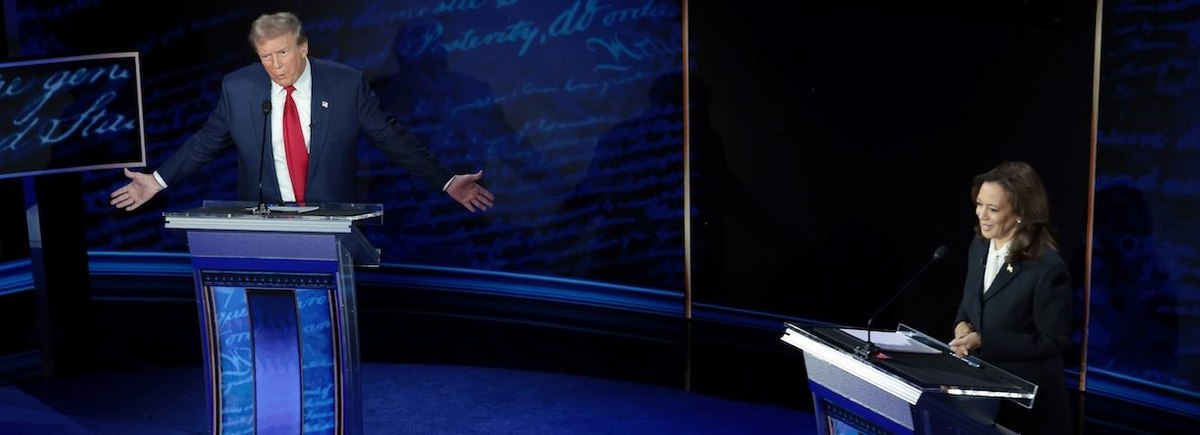This week’s Economist/YouGov poll covers the presidential election, opinions of Kamala Harris, a retrospective of the presidential debate, what Trump supporters believe, and Taylor Swift's endorsement.
Harris vs. Trump
- Kamala Harris, widely perceived as the winner of her first — and likely only — debate with Donald Trump, now leads the race by 4 percentage points among registered voters, according to the latest Economist/YouGov Poll
- This is the largest lead any presidential candidate has registered in any weekly Economist / YouGov Poll in nearly a year, since Joe Biden led Trump by 45% to 40% in the September 23 - 26, 2023 poll
- The poll was conducted after the debate; about one in five respondents completed the poll before news of the second apparent assassination attempt against Trump
- Harris has a large lead among college graduates (55% to 39%), while Trump has a smaller lead among registered voters without a college degree (48% to 44%)
- 96% of Democrats support Harris, 92% of Republicans favor Trump, and Independents are just about evenly divided: 41% support Harris and 40% support Trump
- Registered voters in union households favor Harris by 58% to 33%, while those in non-union households are split, 47% to 47%
- Trump leads among registered voters in military households by 50% to 42%, while Harris leads among others by 55% to 39%; military veterans are especially likely to support Trump (58% to 38%)
- Both candidates’ supporters are about equally enthusiastic, equally likely to say they will vote, and equally committed to their choice: 95% of both Harris supporters and Trump supporters say they will not change their minds
- More than half of Independent registered voters (54%) say they would consider voting for Harris; about half (48%) would consider voting for Trump
Improved opinions of Harris
- 52% say Harris cares about them "some" or "a lot," compared to 41% who say the same about Trump
- 43% like Harris somewhat or a lot as a person, compared to 31% for Trump; 34% dislike her while 53% dislike Trump
- Harris is now nearly as likely as Trump to be viewed as a strong leader: 51% call her a very or somewhat strong leader while 53% say Trump is
- Americans are slightly more likely to be confident in Harris’ ability to handle an international crisis as to be confident in Trump’s ability to do that (42% vs. 40%)
- Americans are divided on whether Harris is honest and trustworthy, as 42% say she is and 41% say she isn't; 32% call Trump honest and trustworthy while 53% say he is not
- 47% of Americans say Trump’s statements are what he really believes, rather what he thinks people want to hear; only 36% say that about Harris
Debate retrospective
- Among the 85% of Americans who saw or heard something about the September 10 debate:
- 56% say Harris won while 27% say Trump did
- Opinion is divided on whether Harris spent more time explaining her views or attacking Trump (43% vs. 44%); by 57% to 29%, Trump was seen as spending more time attacking Harris
- 51% say at least half of Harris’ statements during the debate were true while only 39% say that about Trump’s statements
- Also among the 85% of Americans who saw or heard something about the September 10 debate:
- The dominant emotion Harris supporters say the debate made them feel is optimistic: 49% say that, followed by feeling entertained (33%) and informed (31%)
- 39% of Trump supporters say they felt angry, 29% say anxious, and 26% annoyed; only 9% say optimistic and 10% say entertained
- After the Trump-Biden debate in June, Biden supporters were likelier to be anxious while Trump supporters were likelier to be optimistic
- Though Trump was fact-checked live at the debate by ABC moderators, a majority of his supporters believe several false Trump claims that most Americans do not
- 55% of Trump supporters say that it’s definitely or probably true that Haitian immigrants are eating pet dogs and cats while 24% say it's false; only 27% of Americans say it's true while 55% say it's false
- 55% of Trump supporters say there are states where it is legal to kill babies after birth while 30% say it's false; among Americans overall, 30% say it's true and 57% say it's false
Taylor Swift and celebrity endorsements
- Americans generally like Taylor Swift, but after she endorsed Kamala Harris for president, liking Swift has a partisan tune: 79% of Democrats but only 26% of Republicans like Swift
- Last month, 75% of Democrats and 43% of Republicans viewed Swift favorably
- 61% of Harris supporters but only 11% of Trump supporters say celebrities should publicly endorse political candidates they support
- 61% of registered voters — including 86% of Harris supporters and 33% of Trump supporters — expect Swift’s endorsement will have a somewhat or very positive effect on the Harris campaign
- But only 11% of registered voters say Swift’s endorsement will make them somewhat or much more likely to support Harris — and 79% of them are Harris supporters; 24% — 90% of them Trump supporters — say it will make them less likely to vote for Harris
Throughout this report, some numbers may appear to be off by 1 because of rounding
— Carl Bialik and Taylor Orth contributed to this article
See the toplines and crosstabs for the September 15 - 17, 2024 Economist/YouGov Poll
Methodology: The poll was conducted among 1,592 U.S. adult citizens. Respondents were selected from YouGov’s opt-in panel to be representative of U.S. adult citizens. A random sample (stratified by gender, age, race, education, geographic region, and voter registration) was selected from the 2019 American Community Survey. The sample was weighted according to gender, age, race, education, 2020 election turnout and presidential vote, baseline party identification, and current voter registration status. Demographic weighting targets come from the 2019 American Community Survey. Baseline party identification is the respondent’s most recent answer given prior to November 1, 2022, and is weighted to the estimated distribution at that time (33% Democratic, 31% Republican). The margin of error for the overall sample is approximately 3%
Image: Getty (Win McNamee / Staff)
What do you think about the election, American politics in general, and everything else? Have your say, join the YouGov panel, and get paid to share your thoughts. Sign up here.














